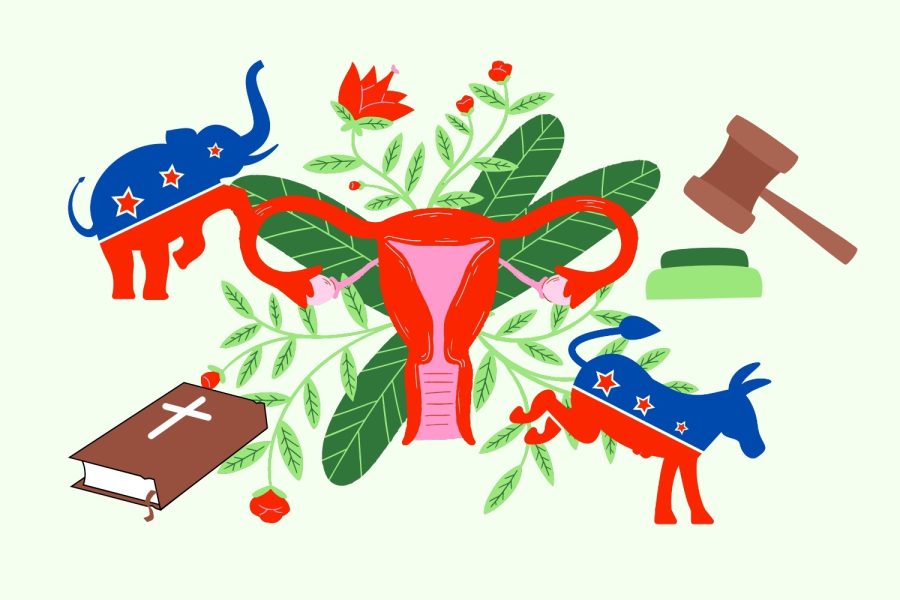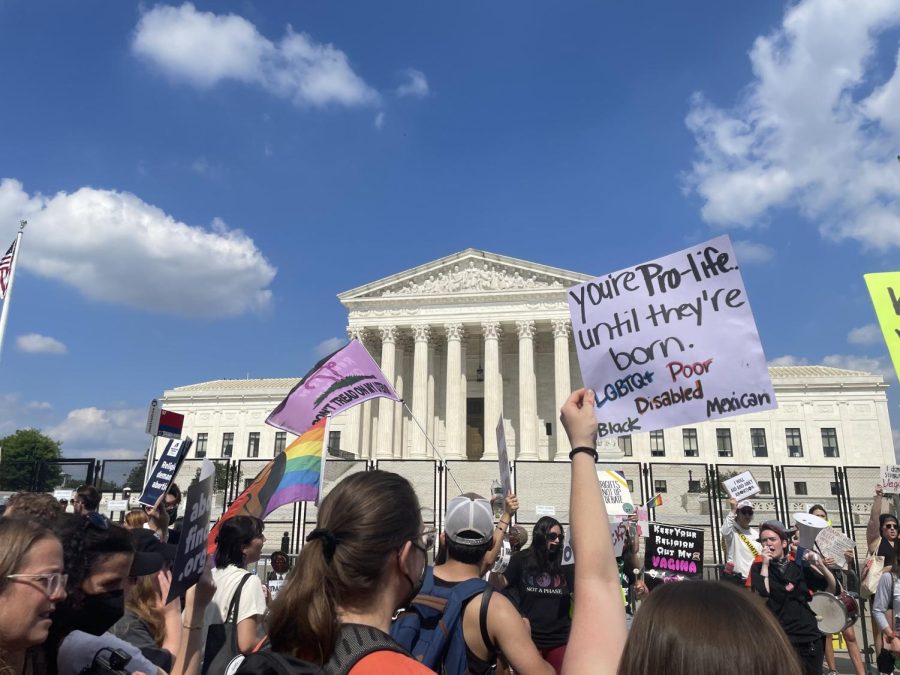The Fall 2023 Vanderbilt Poll surveyed 1,005 registered voters in Tennessee from Nov. 14 to Dec. 2. With a 3.4% margin of error, the poll found bipartisan support for abortion exceptions and gun safety laws, as well as low approval of the state legislature. Respondents also weighed in on the 2024 presidential election.
The Vanderbilt Poll, conducted by the Center for the Study of Democratic Institutions biannually since 2011, is co-directed by political science professor Joshua Clinton and Senior Advisor to the Chancellor John Geer. The poll is conducted via landline and cell phone interviews, with the sample of respondents identified using a registered voter list.
Vanderbilt College Democrats said in an email to The Hustler that the results of the poll show it is important for the state legislature to align itself with Tennessee voters in order to preserve democracy.
“Vanderbilt College Democrats view the Tennessee state legislature’s low approval ratings as indicators of extreme conservative legislators being disconnected from the majority of Tennesseans,” the email reads. “It is imperative for the legislature to prioritize bipartisan, common-sense policies on various issues, such as gun safety, rather than steering our state backward.”
Representatives of the Vanderbilt College Republicans did not respond to The Hustler’s request for comment.
Education
The poll found that 17% of respondents, regardless of party affiliation, view education as a top priority for the Tennessee state government. Clinton said priority is placed on education by voters because it leads to more economic opportunities for children in the future. Republican respondents in the poll voted the economy as the number one issue the legislature should address.
The Tennessee state legislature recently established a task force to explore rejecting the $1.8 billion the state would receive through federal education funding. Conservative politicians in the state legislature dislike the Education Department’s policies under President Biden, especially in regards to explicitly protecting LGBTQ+ minors from discrimination, as required by Title IX. Accepting the funding would require the state to follow federal education guidelines. The polling results saw 58% of registered voters in support of receiving federal funding. This includes 95% of Democratic respondents and 59% of Independent respondents. However, a large majority of MAGA Republicans (65%) favor rejecting the funding.
2024 presidential election
The poll also asked questions about voters’ preferences for presidential candidates. The poll found that 56% of all Republicans prefer Donald Trump as the GOP candidate over Florida Governor Ron DeSantis and former South Carolina Governor Nikki Haley. Trump maintained a majority among both non-MAGA and MAGA Republicans. This is in contrast to the results of the Fall 2022 poll, which showed greater support among non-MAGA republicans for DeSantis as the presidential candidate. When asked who they would vote for between Trump and Haley, voters overwhelmingly chose Trump, with 70% of Republican respondents choosing him compared to 24% who chose Haley.
Geer said the results demonstrate “substantial polarization” within the Republican party.
“The MAGA Republicans are fundamentally different from the non-MAGA Republicans, and you see that split coming in a number of ways,” Geer said. “If, indeed, it was a one-way race between, let’s say, Haley and Trump, it would be close. Trump would still have a lead because he’s got the total loyalty of the MAGA following, but if Haley is able to consolidate the anti-Trump forces, it would be competitive.”
The poll found that Trump would lose votes if he were convicted of one or more felonies by a jury. To a question asking who voters would choose if the 2024 election occurred today, 45% of all respondents answered they would vote for Trump. However, if he were convicted of a felony, only 37% of respondents would vote for him — a decrease visible among non-MAGA Republicans, MAGA Republicans and Independents.
“When we consider the narrow margins of victory in some of the battleground states we saw in 2020, the changes we find in the enthusiasm of support among Independents and non-MAGA Republicans suggest that a conviction could have a decisive effect in closely-contested states,” Clinton said in the press release. “The results are perhaps particularly compelling because they come from Tennessee — a reliably red state where you think voters may be least likely to change their opinion of Trump, given how much support he has in the state.”
Although Trump would lose some votes among Tennessee voters, the state is unlikely to become a close contest in the presidential election. Biden has support from only 26% of the respondents and, according to the press release, will not pick up many votes if Trump were convicted before the 2024 election. Many voters indicated that they would choose a third-party candidate or not vote at all.
Abortion
Tennessee’s current laws on abortion state that a person can only receive an abortion if the pregnancy threatens the pregnant person’s life or health or if the fetus is unlikely to survive the pregnancy. The press release states that these exceptions can only be applied after the application of “reasonable medical judgment” by a healthcare professional. The poll found that 77% of Tennessee voters, regardless of political affiliation, believe abortion should be legal in cases of incest or rape. Almost two-thirds of all Republicans (65%) support this — regardless of MAGA affiliation — as do 79% of Independents.
In Tennessee, abortions are illegal for cases in which the fetus cannot survive outside the womb after birth and physicians determine all other treatments as ineffective. However, 78% of all Tennessee voters believe abortions in the case of a nonviable fetus should be allowed, including 62% of non-MAGA Republicans, 71% of MAGA Republicans, 96% of Democrats and 82% of Independents.
Clinton believes it is important to elevate conversations around abortion cases regarding nonviable fetuses because they are not discussed as often as abortions in cases of incest and rape in the media.
“[When discussing] abortion regulations, rape, incest and life to the mother are prominent. If you actually talk to people, one of the biggest issues of abortion is not so much rape and incest because they are relatively — thankfully — rare,” Clinton said. “But the more common situation in these emergencies is a nonviable fetus, and no one is really talking about that or thinking about that when they’re writing these regulations.”
Gun safety laws
The poll asked six different questions regarding gun reform laws. The poll found that the majority of all voters are in support of passing laws that strengthen background checks for the purchase of firearms for the purpose of reducing gun violence, with 76% of voters supporting such laws across all political identities. Similarly, 76% of respondents support passing laws that restrict access to guns for individuals with identified mental health risks. This majority includes 73% of non-MAGA Republicans, 66% of MAGA Republicans, as well as 70% of people who strongly support the NRA.
Divides appear among voters along party lines when asked about storing guns safely in homes and raising the legal age to purchase assault-style rifles from 18 to 21. Support among MAGA Republicans dropped significantly from other gun reform measures: 41% support passing laws that would require secure storage of firearms in homes to prevent them from being accessed in an unauthorized manner. 45% of MAGA Republicans oppose the passage of such laws, while 68% of all voters support these laws. Similarly, 38% of MAGA Republicans in Tennessee support raising the legal age to purchase assault-style rifles to 21, with 52% opposing. Overall, 64% of all voters support raising the legal purchasing age — the lowest percentage of acceptance of all questions related to the passing of gun safety laws.
Additionally, guns dropped to the fourth-most important legislative priority of respondents. The Spring 2023 Vanderbilt Poll results ranked guns as the third most important topic, after it ranked last or nearly last for 20 consecutive surveys. The poll was conducted soon after the Covenant School shooting, the deadliest mass shooting in the state’s history.
“The shooting galvanized the issue among Democrats, but it doesn’t seem to have really moved the needle much among Republicans,” Clinton said. “The dissatisfaction that was expressed towards the state legislature that we saw around the time of the Covenant shooting has not bounced back. I think it persisted, but then it declined further.”
State legislature
The Tennessee state legislature held a special session in August to discuss gun reform laws after the Covenant School shooting in April. The poll found that most Tennesseans did “not at all closely” follow news regarding the special legislative session, but more Democrats followed somewhat closely (35%) than Republicans or Independents. When those that did follow the news were asked if they approved of the state legislature’s accomplishments during the session, 54% of all voters said they disapproved. The numbers differed based on party affiliation, with 45% of non-MAGA Republicans and 43% of MAGA Republicans saying they approved, and 74% of Democrats and 58% of Independents saying they disapproved.
The Vanderbilt Poll shows that the Tennessee legislature often takes a different stance on issues related to education, abortion and gun safety than registered voters in the state. The poll found the legislature to have a historically low level of approval at 42%. Geer describes this as the result of a Republican supermajority in the legislature.
“Legislatures can act in ways that are out of step with the will of the people when one party dominates the chamber with a supermajority, as Republicans currently do in Tennessee,” Geer said in the press release. “It is problematic for states when general elections are not competitive and one party wields all of the power. Monopolies rarely work and certainly do not serve the interest of consumers — or, in this case, voters.”
Clinton believes that state legislators often act differently from what their constituents want because they are afraid of losing their seat to competitors with more extreme views.
“On the Republican side, they have to worry about people that are more extreme than themselves, and that causes them to enact all these laws that are far more extreme than, I think, what the public actually wants,” Clinton said.













